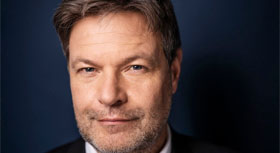You can subscribe to the Energy Transition
Order the international edition of the "Energiewende direkt" Newsletter here.
At the end of July, the Federal Cabinet adopted an update of Germany’s National Hydrogen Strategy. This recast sends a strong signal for the next phase of Germany’s hydrogen ramp-up and its path to climate neutrality. The key details at a glance.
Find out moreHydrogen is seen as a beacon of hope for the energy transition. Parliamentary State Secretary at the Federal Ministry for Economic Affairs and Climate Action, Dr Franziska Brantner, is joined by experts from research and industry to explain what a hydrogen economy actually needs to work.
Find out moreGermany has an Emergency Plan for Gas made up of three levels. It stipulates the steps to be taken if the security of gas supply in Germany is at risk. The Plan has now been revised and expanded to include the experience gained since the ‘early warning level’ of the Emergency Plan was declared in March 2022.
Find out moreIn the 2023 update of the National Hydrogen Strategy, the target for hydrogen electrolysis capacities was raised from five gigawatts by 2030 to ten. The image below shows how much our hydrogen demand will increase in the future.
Find out morePhotovoltaics is considered one of the most efficient energy sources for the energy transition. By 2030, some 215 gigawatts are to have been installed in Germany in total. To realise this objective, the pace of expansion must now triple. The solar package shows how this is to be achieved.
Find out moreFor Germany to be able to cover the majority of its electricity demand though renewables in the near future, new solar installations need to be connected to the grid more quickly. The complex certification procedure has now been simplified – even for large installations.
Find out more
“Offshore wind energy plays a central role in the energy transition. Expanding it will provide enormous economic opportunities for Germany and the maritime industry.”
Federal Minister Robert Habeck on the occasion of the 13th National Maritime Conference
This month in ‘What the press say’: Fewer hurdles for balcony-based power plants, heat pumps examined in a widescale study and innovations from the Husum Wind Fair.
Find out moreOn 26 July, the Federal Cabinet adopted the Federal Government’s Lightweighting Strategy. The strategy is to support the sustainable transformation of industry and help foster its innovative strength and competitiveness.
From the expansion of its electricity grid to the promotion of hydrogen power plants, Germany is making its energy system fit for the future. A new, interactive website shows how this all works.
Europe’s largest climate conference for young people, the LCOY, will take place in Munich from 6 to 8 October 2023. Its goal is to unite the youngest generation behind sustainability and climate action. The event will feature some 250 lectures, workshops and discussion panels.
A broad alliance of stakeholders met in Berlin today for the third Heat Pump Summit, where they discussed progress on the roadmap for Germany’s heat pump ramp-up. The focus of the Summit was on skills training and consulting for this task. The meeting reaffirmed that a large part of the measures agreed for 2023 are on track and support the goal of being able to install at least 500,000 heat pumps per year from 2024.
Order the international edition of the "Energiewende direkt" Newsletter here.